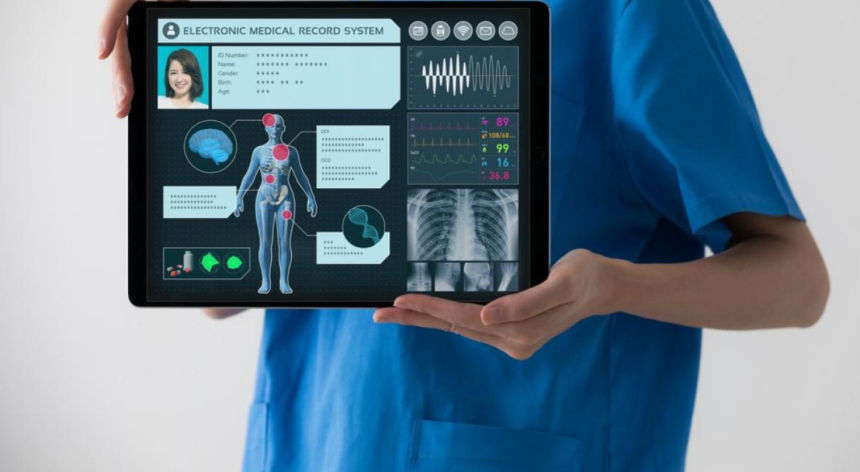Medical records have come a long way since the days of paper files, and so too has their management. Electronic health record (EHR) systems are quickly becoming the standard for medical providers across the world as they provide numerous benefits over paper charts.
Not only can EHRs help streamline patient relations, but they also improve healthcare processes, reduce operating costs, and enable more accurate diagnoses.
In this blog post, we explore how EHRs make this possible and why it’s important to know how these systems work if you’re a medical practitioner or provider in today’s tech-driven society.
What are Electronic Health Records (EHRs)?
Electronic Health Records, also known as EHRs, are a digital record-keeping system for a patient’s medical history, including diagnosis, treatments, and any other information relevant to their health. EHRs can easily be accessed and shared by healthcare providers, allowing for better coordination of care and improved patient outcomes.
The transition to electronic records has transformed the healthcare industry, saving time and reducing errors. With EHRs, healthcare providers have quick access to complete patient medical records, which allows for more informed decisions, better healthcare quality, and ultimately healthier patients.
Benefits of EHRs and Why They Are Important
Electronic Health Records (EHRs) are becoming increasingly important in the healthcare industry, and for good reason. These digital records allow for a more streamlined and efficient healthcare system that ultimately benefits both patients and providers.
EHRs can reduce errors through automated alerts and reminders, improve care coordination through secure and accessible patient information, and provide valuable data for research and population health management. In addition, the implementation of EHRs has the potential to decrease healthcare costs and mitigate the risks of fraudulent activity.
Overall, the benefits of EHRs cannot be ignored, and their importance in modern healthcare continues to grow.
How Do EHRs Help Patients and Caregivers Get Better Care Quality and efficiency?
In today’s world, with technology advancing at an unprecedented rate, it’s hard to imagine a world without electronic health records (EHRs). EHRs serve as a game-changer when it comes to healthcare, providing patients and their caregivers with better care quality and increased efficiency.
From recording and tracking medical histories to keeping track of upcoming appointments and necessary medications, EHRs are designed to ensure that individuals receive nothing but the best care possible. With EHRs, there is no more struggling with missing or forgotten healthcare information, as healthcare providers have access to all relevant data in one centralized location.
EHRs enable patients and caregivers alike to receive personalized care, while healthcare providers can make informed decisions backed by comprehensive data, ensuring everyone gets the optimal care they deserve.
How to Ensure Data Security When Using EHR Systems
As electronic health records (EHR) become more common in healthcare settings, it’s important to ensure that patient data remains secure. To achieve this, there are a few key steps to take.
First, it’s crucial to limit access to the EHR system to only authorized personnel and to train those authorized personnel on proper security practices. Additionally, strong passwords and two-factor authentication should be used to prevent unauthorized access.
It’s also important to regularly backup and encrypt the data stored in the EHR system. By taking these measures, healthcare providers can rest assured that they are doing everything possible to protect patient privacy and safeguard sensitive information.
The Future of EHRs and Their Impact on Healthcare Delivery
As technology continues to advance, so does the field of healthcare. One major technological innovation that has changed the way healthcare delivery functions is the implementation of Electronic Health Records (EHRs).
The future of EHRs is bright, as these records allow for more organized and efficient patient care. They also enable healthcare providers to have quick and easy access to a patient’s medical history, resulting in more accurate diagnoses and treatment plans.
With the ability to share information electronically between healthcare providers, EHRs promote collaboration and improve patient outcomes. As we move forward, it is exciting to see how EHRs will continue to impact and transform the healthcare industry.
Challenges in Adopting an Electronic Health Record System
Adopting an electronic health record (EHR) system may seem like an obvious solution to help streamline healthcare processes, but it’s not without its own set of unique challenges. Healthcare providers must navigate complex regulatory requirements and the intricacies of patient privacy measures to select and implement an EHR system that’s effective and secure.
On top of that, introducing a new system requires training and significant adjustments to existing workflows, which can negatively impact staff productivity and patient experience. While the benefits of EHRs are undeniable, healthcare providers should proceed with a thoughtful and well-planned approach to minimize disruptions and ensure a successful implementation.
In conclusion, Electronic Health Records (EHRs) offer numerous advantages for patients and healthcare providers alike. With these advances, we are sure to experience even higher levels of patient satisfaction and better collaborative outcomes from the continued use of EHRs.














